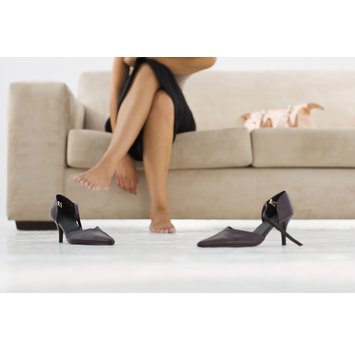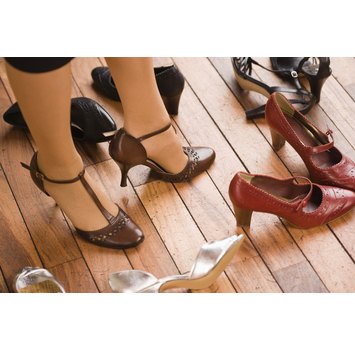For many women, high heels
are a treasure. Sure, they hurt your feet sometimes, but what other
accessory can add an instant dose of glam – and a few slimming inches --
to your look? Because you love your high heels so much, they probably
get a lot of wear, which means they’re bound to take a beating along the
way. So how do you know if your heels still have some life in them or
whether they’re past their expiration date? Learn to decipher when
they're worth repairing -- and when it's time to say goodbye.
Take Action
 If your heels aren't comfortable, you'll never want to put them on. (photo: Jupiterimages/Pixland/Getty Images)
If your heels aren't comfortable, you'll never want to put them on. (photo: Jupiterimages/Pixland/Getty Images)
Before you don your
shoes for their first night out, take several steps to help them live a
longer – and more comfortable – life. “A shoe can last your whole
lifetime if you take care of it and don’t wear it every day and do the
little tiny maintenance things to keep them good,” says Lori McCravey,
head buyer for FootFitter.com, a shoe and footwear care site.
The first thing you should do --
even before you actually buy a pair of high heels -- is make sure the
heels fit properly and are comfortable enough to walk around in. If you
need help finding the best fit for your foot, ask an associate at the
shoe store or boutique. “[With] shoes, if they don’t feel good, you
might as well not have them,” McCravey warns. “If they’re not
comfortable, you can buy tons of little inserts or insoles or pads for
the inside of your shoes to make them comfortable.”
There are an endless number of
different inserts and shoe pads that work specifically for high heels,
whether it’s an open-toe padded insole or a heel pad to prevent
blisters. Work with the shoe store associate to figure out what you’re
going to need to be comfortable in the shoes before you purchase them.
Once you’ve claimed your new shoes,
take a few more measures to protect and prolong their life. First, add
an extra rubber sole on the bottom of your heels to keep them from
wearing down. “One thing we do with Louboutins is we put a very thin
rubber sole of the bottom of the shoe -- and we happen to use a red
rubber sole. That protects the actual sole, and that can be done with
any shoe,” says Wayne Edelman, president of Meurice Garment Care, a
high-end garment and accessories cleaner in New York.
Edelman also adds rubber heel caps to protect the original heel.
Finally, protect your new heels
from water and stains by using a rain and stain repellent, which can be
found at most shoe stores. This spray doesn’t make shoes waterproof, but
it makes them less likely to absorb water or other liquids and makes
cleaning easier, Edelman suggests.
Lasting Power

Once you start
strutting around town in your new heels, there are several things you
can do to make sure they look fabulous for as long as possible. First,
try not to wear your heels on rainy or snowy days, since water can
damage them. If they do get wet, make sure to dry them out properly. “We
recommend even stuffing some newspaper in them,” Edelman says. “And
never dry them by the fireplace or the heater.” Drying them by a direct
source of heat will strip the shoe’s leather of its natural oils,
leaving it cracked and distorted.
If you have to wear heels in wet
weather, opt for a pair made from synthetic materials, like vinyl.
“There are a lot of plastics now being used in shoes,” Edelman explains.
“They handle moisture better than a natural substance like suede or
leather.”
Another alternative is to simply
wear another pair of shoes (cute ballet flats or comfy sneakers) during
your commute or your time outside, then change into your heels once you
get to your destination.
If you have leather shoes, it’s
important to keep them well conditioned, McCravey recommends. “If you
keep your leather conditioned nicely, they’ll be more flexible and
stretch with your feet more.” Make sure you’re polishing and
conditioning your heels regularly, even if it means taking just a few
minutes to brush the dirt off and rub in some shoe polish.
Another way you can treat your
shoes nicely: “Don’t throw them in a big pile in the closet,” McCravey
insisted. “If you don’t keep your shoe boxes, you might consider a shoe
bag to put them in so they don’t scratch against other shoes.”
McCravey also suggests purchasing
shaft shapers to slide inside your high heel boots to help them stand up
straight and keep their shape. This prevents lines and cracks from
forming in the leather.
Be Flexible, Own More
If you want your shoes to treat
you nicely, make some adjustments. “All shoes can be kind of
uncomfortable sometimes, but those kind of things are temporary,” says
McCravey. “If a shoe is absolutely pinching your toes or makes your feet
ache when you take them off, you either need to adjust your shoes for
your feet -- or you shouldn't wear those shoes.”
Purchase a shoe stretcher – you can
get a high heel-specific stretcher on many shoe sites online – to
stretch out your shoes and give your feet a bit more room. “It can make
a huge difference on the wear of your shoe,” McCravey says. “It can
make your shoe last much longer, and your feet will feel so much
better.”
One final piece of advice: Rotate
your heels. “Though you have a favorite pair, you should try to
alternate several pairs,” Edelman suggests. Having multiple pairs of
heels means you’ll wear each one less often, making them last much
longer.
Edelman's rule to for well-heeled women to live by? "The more, the merrier: The more you have, the longer each one will last.”


Post a Comment